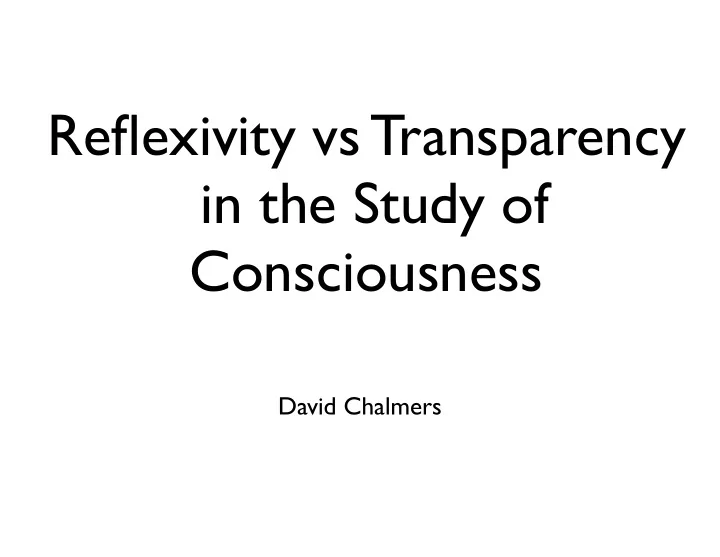

Reflexivity vs Transparency in the Study of Consciousness David Chalmers
Models of Consciousness • Models of consciousness tend to endorse either • transparency: we are aware only of externalia (the objects, colors, etc represented in consciousness) • reflexivity: we are aware of our experiences (and of ourselves?)
Strong and Weak Theses • Strong Reflexivity: We are always aware of our experiences • Weak Reflexivity (Weak Transparency?): We are sometimes aware of our experiences. • Strong Transparency: We are never aware of our experiences
Varieties of Awareness • N.B. Awareness here should be something like (quasi-perceptual) property-awareness or event-awareness, now just (quasi- cognitive) fact-awareness.
Against Strong Transparency • I deny strong transparency and favor at least weak reflexivity: I think we are at least sometimes aware of our experiences.
Phenomenological Experiment • Move your head and attend externally: nothing seems to change • Now attend to your experience: something seems to change dramatically. • You’re aware of a change; the external world doesn’t change; so it’s a change in your experience.
Attention and Awareness • This strongly suggests: we can be aware of features of our experiences, when we attend to them. • This falsifies a strong transparency thesis.
Weak Reflexivity • Many phenomenological arguments for reflexivity, including this one, establish only weak reflexivity: • When we attend to our experiences, we’re aware of them.
Consciousness without Attention • What about experiences we don’t attend to? • Introspection arguably doesn’t tell us whether we’re aware of these (since when we introspect, we attend). • So introspection is consistent with denying strong reflexivity?
Abductive Argument • Abductive argument for strong reflexivity: strong reflexivity is the best explanation of weak reflexivity.
Explaining Attention • Q: How can we attend to our experiences? • A: Because we’re already aware of them (or acquainted with them) and we exploit this awareness relation.
Alternative Model • Alternative: attention to experience creates awareness of experience. • Pre-attention, we are aware at most of associated externalia. • Post-attention, we’re aware of our awareness of externalia. • Q: How do we become so aware?
Question • Question: What other reasons are there to favor strong reflexivity over weak reflexivity? • Phenomenology • Explaining attention/introspection? • Uniformity? • …
Strong Reflexivity Model • The model I like: in experience, we’re always aware of externalia and aware of our awareness of externalia.
Varieties of Awareness • There are two levels of awareness here • Awareness of externalia is awareness1: phenomenal representation (nonfactive) • Awareness of experiences is awareness2: Russellian acquaintance (factive).
Hierarchy and Regress? • When we’re aware1 of x, we’re aware2 of being aware1 of x (in virtue of the nature of awareness1). • When we’re aware2 of x, are we aware2 of being aware2 of x? • [Either no; or being aware2 of x is not a distinct phenomenal state from x.]
Relationship • What’s the relationship between being aware1 of x and being aware2 of being aware1 of x? • They’re not identical (different logical structure). • But they have the same phenomenology (not both phenomenal states; being aware2 is a phenomenally conscious mental state).
Grounding • My view: being aware1 of x grounds being aware2 of being aware1 of x. • By the nature of the phenomenal, one is always acquainted with the phenomenal. • Phenomenal awareness is by its nature self- revealing.
Phenomenology and Awareness • I think: it’s an essential (and analytic) feature of the phenomenal that for any phenomenal state, we’re aware of (acquainted with) being in it. • The acquaintance is not a separate phenomenal state; it’s an aspect of the original phenomenal state, and has exactly the same phenomenology.
Toward a Reduction? • Can we use this model to reductively analyze the phenomenal? • E.g. a state is phenomenal if we’re aware of being in it? (higher-order theories?) • Or, if we’re aware of being in it by virtue of being in it? (self-rep theories?)
More Needed • No: either aware = phenomenally aware, in which case there’s no reduction. • Or aware = represents (or some broader notion), in which case the definition is inadequate.
Non-Conscious Representation • Common objection to representationalism: unconscious states can represent, so representation doesn’t suffice for consciousness. • One needs X-representation (= conscious representation) for an adequate theory.
Non-Conscious Self-Representation • Objection to representationalism: unconscious states can self-represent, so self-representation doesn’t suffice for consciousness. • One needs X-representation (= conscious representation) for an adequate theory.
Candidates for X • Candidates for X: • representation that plays a functional role (usual problems for functionalism about consciousness) • explicit representation (inadequate) • conscious representation (nonreductive) • …
Order of Grounding • I think: rather than self-representation grounding experience, experience grounds self-representation. • Nonreductive self-representationalism?
Self-Awareness • Q: Does awareness of our experiences entail awareness of self? • A: I think so.
Experiences and Subjects • I think: it’s analytic that every experience is had by someone. • Experience = what it is like to be = what it is like to be a subject. • Maybe momentary, maybe nonsubstantial, but still a subject! • What are the arguments for subjectless experiences?
Awareness of Subjects • When one’s aware of an experience, one is aware of what it is like to be (a subject), so one is at least tacitly aware of a subject. • Perhaps one could be aware merely of someone’s having this is experience? But experience doesn’t seem like this. • One is acquainted with a concrete event: the event of my having this experience.
Consciousness and Self-Consciousness • If so: all consciousness involves self- consciousness.
Residual Issue • Residual issue: how can there be a self- revealing relation of consciousness” • i.e. a relation awareness1 such that whenever S is aware1 of x, S is acquainted with S’s being aware1 of x?
Homework Exercise • I’ll leave that as a (hard) homework exercise.
Recommend
More recommend